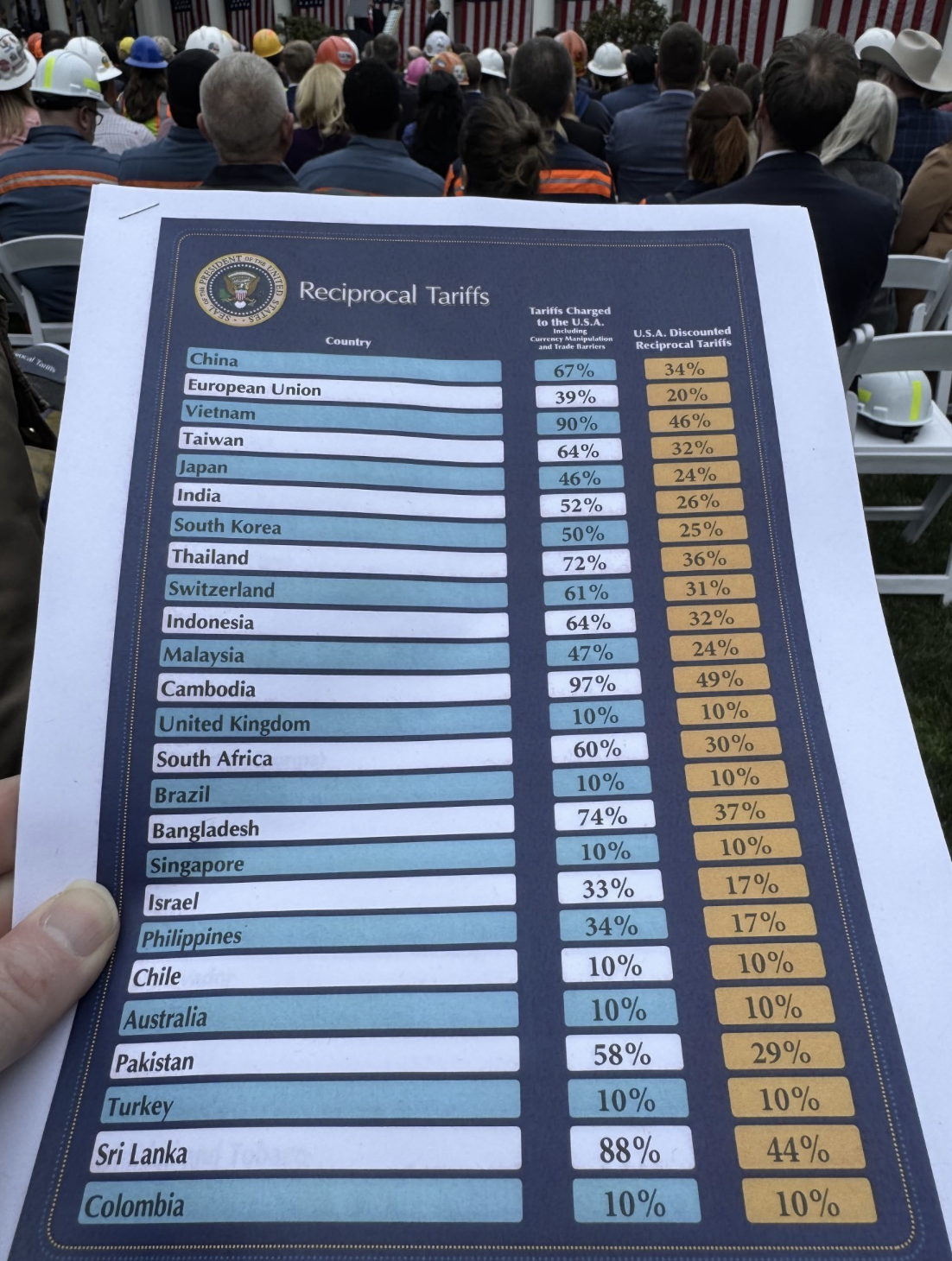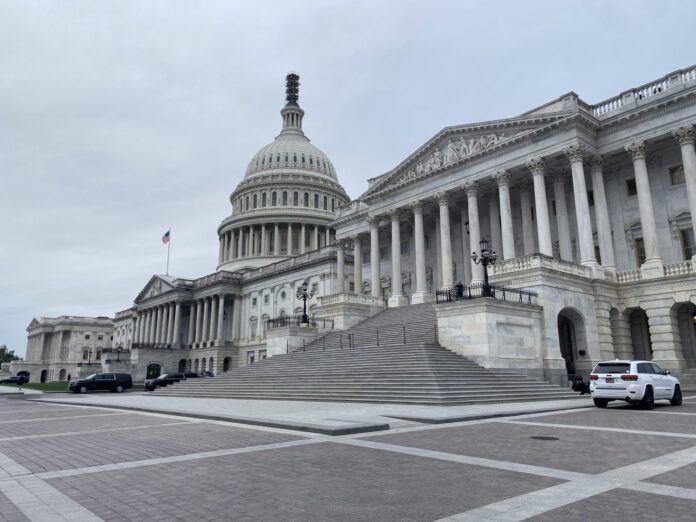WASHINGTON (States Newsroom) — President Donald Trump rolled out sweeping “reciprocal” tariffs Wednesday on trading partners and allies across the globe.
Declaring that foreign trade practices have created a “national emergency,” the president unveiled a baseline 10% levy on all international imports, plus what he described as additional “kind” and “discounted” tariff rates that will increase but not match the rates other countries apply to American imports.
The levies will hit U.S. industries from agriculture to manufacturing to fashion.
The 10% universal tariffs become effective April 5, with higher levies set for April 9, according to Trump’s executive order. Trump’s remarks Wednesday about the start dates varied from the order’s language.
Trump is the first president to enact tariffs under the International Emergency Economic Powers Act — something he already did in March when slapping levies on China, Canada and Mexico over the production and smuggling of illicit fentanyl.
According to a table distributed at Trump’s speech, U.S. tariffs will reach 34% on imports from China, 46% on products from Vietnam and 20% on European Union imports, among other increases.
Canada and Mexico will not see additional tariffs on top of the already imposed 25% on goods (10% on energy and potash) not compliant with the United States-Mexico-Canada Agreement, or USMCA. All compliant goods can continue to enter the U.S. levy-free.
The new 34% duties on China are set to stack on top of older 20% tariffs, according to some media reports, though Trump did not specify in his remarks or order.
Countries that levy a 10% tax on American goods — including Brazil and the United Kingdom — will only see a 10% match.
The increased levies come as 25% tariffs on foreign cars kick in at midnight.
Business owners who purchase goods from outside the U.S. will have to pay the increased duty rates to bring the products over the border, unless Trump carves out exceptions for certain industries.
The president did not mention carve-outs in his remarks, but language in his subsequent executive order details exceptions for steel, aluminum, cars and auto parts already subject to tariffs under Section 232 of the Trade Expansion Act. Any products designated in the future under Section 232 will also be exempt from the new levies announced Wednesday.
Other goods not subject to the “reciprocal” tariffs include copper, pharmaceuticals, semiconductors, lumber, and “energy and other certain minerals that are not available in the United States,” according to the order.
Trump introduced the taxes on imports with fanfare Wednesday in the White House Rose Garden, where he said, “This is Liberation Day.”
“April 2, 2025, will forever be remembered as the day American industry was reborn,” Trump said.
“For decades, our country has been looted, pillaged, raped and plundered by nations near and far, both friend and foe alike,” Trump said.

Republican lawmakers, including House Speaker Mike Johnson of Louisiana and Georgia U.S. Rep. Marjorie Taylor Greene, attended the event alongside several of Trump’s Cabinet members and representatives from the United Auto Workers.
Not all Republicans have signaled support for tariffs. Senate Majority Leader John Thune said at an event in his home state of South Dakota in August 2024 that Trump’s trade policy is a “recipe for increased inflation.”
The White House has circulated figures claiming the U.S. will raise up to $600 billion in revenue per year as a result of the tariffs. The figure was met with skepticism by economists because the amount of imports will likely change under higher levies.
The U.S. is the largest importer of goods in the world, according to the Office of the U.S. Trade Representative. The country’s top suppliers in 2022 included China, Mexico, Canada, Japan and Germany.
Economists: Americans will pay
Since Trump began campaigning on tariffs, economists have warned that increased costs for businesses will be passed onto consumers.
Rising prices under Trump’s “reciprocal” tariff scenario are likely to cost an extra $2,400 to $3,400 per family, according to the Yale Budget Lab, with most of the financial burden falling on the lowest-income households.
An analysis from the Peterson Institute on International Economics estimated the typical American household would lose over $1,200, just from the 25% tariffs already imposed on China, Canada and Mexico.
Several small business owners told States Newsroom Tuesday they’re worried about increasing production costs and whether higher prices will chase away customer demand.
Erica York, of the center-right Tax Foundation that advocates for lower taxes, said in an interview with States Newsroom Tuesday that the levies will be “the largest peacetime tax increase we’ve seen in history.”
State officials worry over impact
Democratic state officials sounded the alarm Wednesday over losses for key industries that drive their local economies.
New Mexico State Treasurer Laura Montoya said her state’s energy and agriculture sectors would be victims in a trade war.
“New Mexico is a key player in this conversation, because the non-negotiable reality is that New Mexico is, like the United States as a whole, dependent on trade with our international partners particularly Mexico,” Montoya said on a virtual press briefing hosted by the state economic advocacy group Americans for Responsible Growth.
Montoya said oil and gas production accounts for 35% of the state’s budget and that the industry relies on machinery imported from Mexico.
Additionally, New Mexico, a largely rural state, relies heavily on agricultural trade. It processes a third of the cattle coming across the southwest border, and Montoya said farmers and ranchers will “face blows as tariffs on cattle and produce will result in slow food production.”
Washington state, a top U.S. agricultural exporter, sources 90% of its fertilizer from Canada.
Treasurer Mike Pellicciotti said the state would be “completely squeezed” by “reckless economic decisions.”
“He is crushing the free exchange of goods, and making it much more difficult and much more burdensome on working families. So of course, he needs to call it ‘Liberation Day,’ because he knows he’s doing the complete opposite, and he is trying to frame it in a way that is completely the opposite of what is being accomplished today,” Pellicciotti said.
Dems predict consumer stress
Democrats on Capitol Hill seized on Trump’s new trade policy as a way to push their message that the president is abandoning middle and working class households.
Sen. Angela Alsobrooks of Maryland said the White House is “tone-deaf” in dubbing the tariff announcement as “Liberation Day.”
Trump has said in media interviews, “‘You know, there’s going to be a little pain, some minor pain and disruption.’ But the people that I represent don’t regard increasing costs of groceries, increasing costs of owning a home, increasing costs of owning an automobile, as a minor disruption,” Alsobrooks said.
In back-to-back Democratic press conferences Wednesday, Sen. Tim Kaine of Virginia slammed Trump’s use of emergency powers in March to justify a 10% duty on Canadian energy and 25% on all other imports.
Kaine warned about the effect on his state’s sizable shipbuilding industry. Approximately 35% of steel and aluminum used to build U.S. ships and submarines comes from Canada, he said.
Senators approved, 51-48, a joint resolution Wednesday evening on a bill, sponsored by Kaine, that would undo Trump’s tariffs on Canadian imports triggered by an emergency declaration targeting illicit fentanyl coming over the northern border.
Four Republicans joined the Democrats in passing the largely symbolic legislation, which will now head to the House. The GOP senators included: Susan Collins of Maine, Mitch McConnell and Rand Paul of Kentucky, and Lisa Murkowski of Alaska.
Earlier Wednesday, Kaine pointed to a report in Canadian news outlet The Globe and Mail that found the White House grossly overstated the amount of fentanyl smuggled through the northern border.
“Canada stood with us on 9/11, Canada has stood side-by-side with U.S. troops in every war we have been in. They have fought with our troops. They’ve bled with our troops. They’ve died with our troops in every war since the war of 1812, and yet we’re going to treat them like an enemy,” Kaine said.
Kaine’s bill, co-signed by eight Democratic and independent senators, drew one Republican co-sponsor, Paul of Kentucky.
The bill gained statements of support from the U.S. Chamber of Commerce and former Vice President Mike Pence’s advocacy group Advancing American Freedom, among numerous organizations across the political spectrum.
House Minority Leader Hakeem Jeffries criticized Trump’s anticipated tariff announcement Wednesday morning at his weekly press conference.
“We were told that grocery costs were going to go down on day one of the Trump presidency. Costs aren’t going down in America. They’re going up, and the Trump tariffs are going to make things more costly,” Jeffries, of New York, said.
Republican lawmakers, including House Speaker Mike Johnson of Louisiana and Georgia U.S. Rep. Marjorie Taylor Greene, attended the event alongside several of Trump’s Cabinet members and representatives from the United Auto Workers.
The White House has circulated figures claiming the U.S. will raise up to $600 billion in revenue per year as a result of the tariffs — an estimate met with skepticism by economists.















